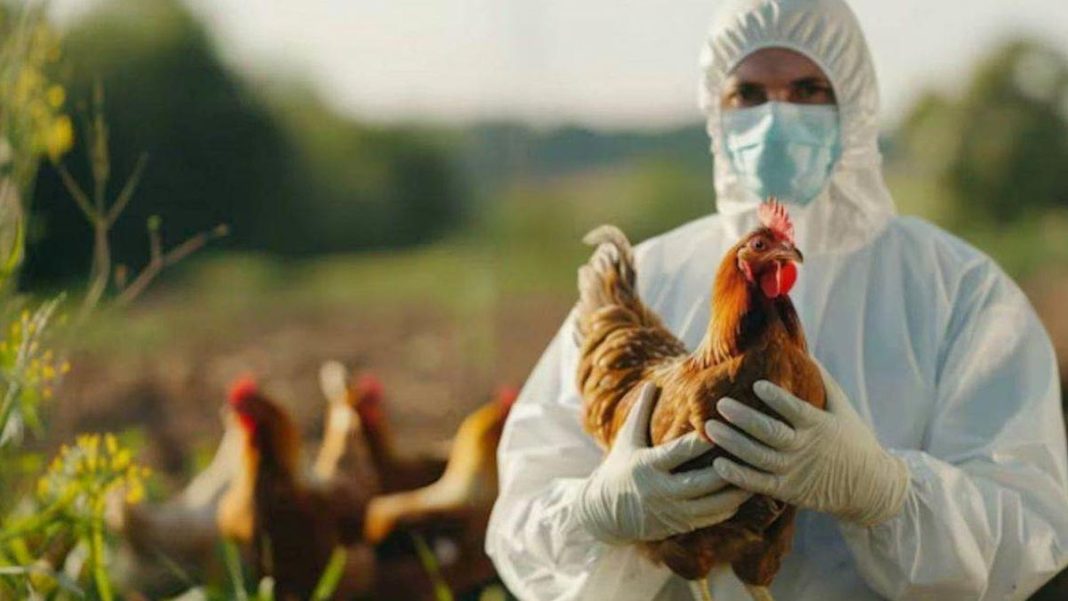Avian influenza, commonly known as bird flu, is a viral infection that primarily affects birds, though it can occasionally spread to humans in rare instances. The virus has several subtypes, with H5N1 and H7N9 being the most commonly associated with human infections in the past. These infections typically occur when humans have close contact with infected birds or contaminated environments.
Maharashtra’s Mangli Village Reports Bird Flu Outbreak
In a recent development, the village of Mangli in Maharashtra’s Chandrapur district has reported an outbreak of the H5N1 bird flu virus. Laboratory tests confirmed the presence of the virus in poultry birds that were found dead on January 25. Following the discovery, the district administration has declared Mangli village and the surrounding areas within a 10 km radius as an ‘alert zone.’ The local government has issued strict measures to contain the spread of the virus. The District Disaster Management Authority has ordered the implementation of preventive protocols, including culling infected birds, disinfection of areas, and monitoring poultry farms.
This outbreak has raised concerns about the potential risk of human transmission, especially in a densely populated area like Mangli village. However, human infections are rare, and the district has been taking swift action to minimize the risk.
Symptoms of Bird Flu (H5N1 Virus)
While bird flu primarily affects birds, the H5N1 strain of avian influenza can occasionally infect humans. The symptoms of bird flu are similar to those of regular influenza, though some symptoms may be more severe. Common symptoms of H5N1 bird flu in humans include:
• Pink eye (Conjunctivitis): Inflammation or redness of the eye.
• Fever: High body temperature often associated with flu-like illness.
• Cough: Dry or productive cough.
• Fatigue: A sense of tiredness or exhaustion.
• Muscle aches: General body pain or soreness.
• Sore throat: Irritation or pain in the throat.
• Gastrointestinal issues: Nausea, vomiting, and diarrhea are common.
• Stuffy or runny nose: Nasal congestion or discharge.
• Shortness of breath: Difficulty breathing or rapid breathing.
It is important to note that not everyone with bird flu will experience all these symptoms. The severity of illness can vary depending on individual factors, such as pre-existing health conditions or the amount of exposure to infected birds.
Is Bird Flu Contagious?
While bird flu primarily affects poultry and other bird species, it can be transmitted to humans in rare instances. The virus spreads through direct contact with infected birds, their droppings, or contaminated environments. Human infections are more likely to occur among individuals who have close contact with infected poultry, such as farmers, poultry workers, or those handling live birds. Transmission through airborne particles is considered unlikely, but it can happen under certain conditions.
It is important to note that human-to-human transmission of the virus is extremely rare. However, cases of person-to-person spread have been reported in isolated instances. Therefore, authorities emphasize the need for caution, especially in areas with known outbreaks.
Prevention Tips for Bird Flu
To protect yourself from the potential spread of bird flu, especially in areas where the virus is present, it is essential to follow safety guidelines and precautions. Here are some key prevention tips:
• Get a flu shot: While a flu shot won’t protect against bird flu, it can help minimize the risk of seasonal flu, which shares similar symptoms and can worsen the overall condition of an infected person.
• Practice good hygiene: Always wash your hands thoroughly with soap and water after handling birds or being in areas where they are present. Hand hygiene is critical in preventing the spread of infectious diseases.
• Avoid contact with sick birds: Stay away from birds that appear sick or have been exposed to avian influenza. If you notice unusual behavior or a sudden increase in bird deaths, report it to local authorities.
• Seek medical attention: If you experience symptoms of bird flu, especially after contact with poultry or birds, it is crucial to seek medical help promptly. Early diagnosis and treatment can reduce the severity of the illness.
• Cook poultry and eggs thoroughly: Make sure to cook poultry and eggs properly to kill any potential viruses. Avoid consuming raw or undercooked eggs or poultry meat.
While the risk of contracting bird flu remains relatively low for the general population, it is essential to stay informed and follow preventive measures, particularly in areas where outbreaks have been reported. With swift action from local authorities and awareness from the public, the spread of H5N1 and other avian influenza strains can be minimized, reducing the potential risks to human health.
By adhering to these simple precautions and remaining vigilant, the public can play an active role in preventing the spread of bird flu and protecting both human and animal health.
ALSO READ – Kerala Disappointed with Railway Budget



